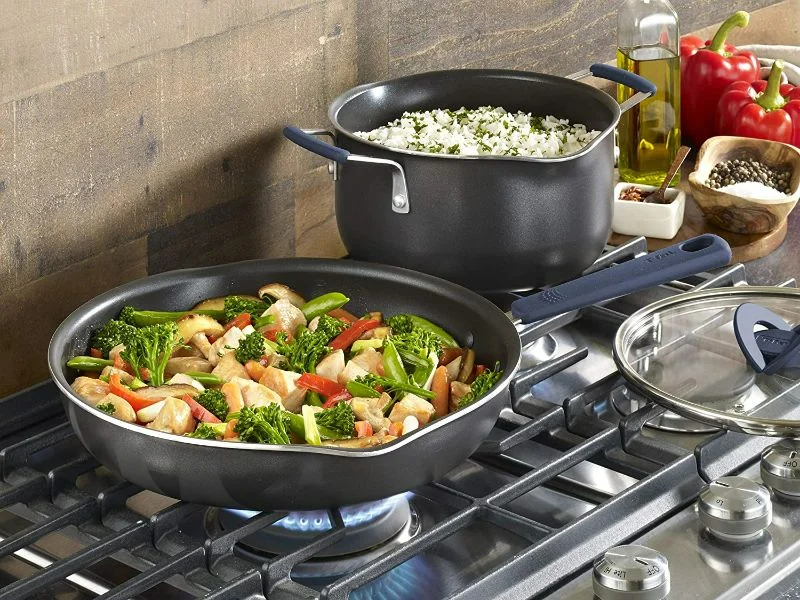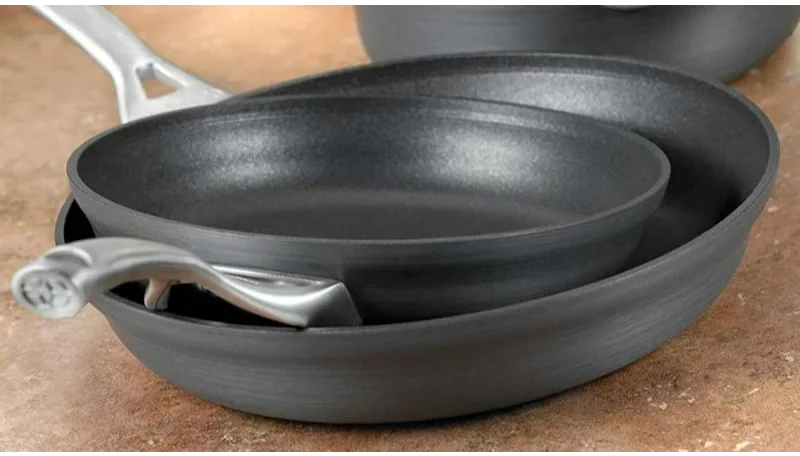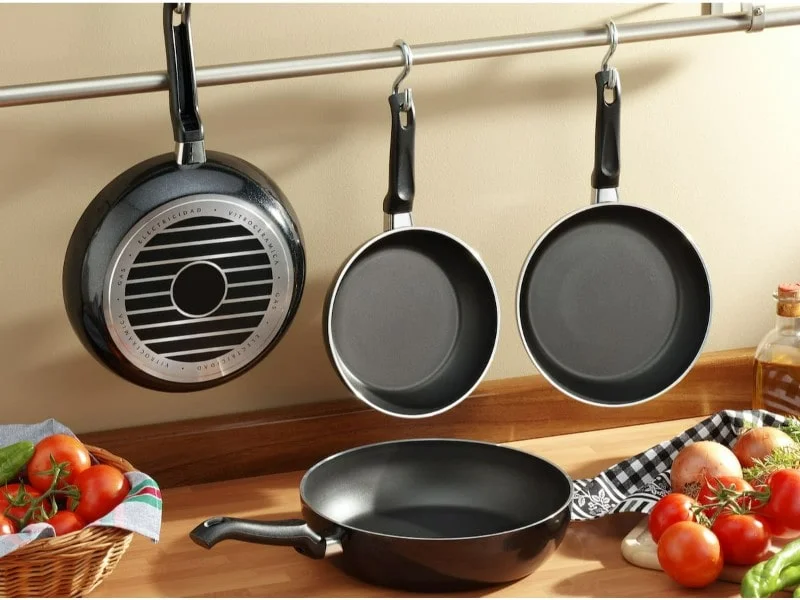Is hard anodized cookware safe? Is it really worth the money? What does it mean to be “hard anodized,” and what are its benefits? It may seem like a no-brainer, but you do not want to be “hard anodized”? That’s why we have compiled this list of reasons why buying hard anodized cookware is beneficial.
Hard anodized cookware is a type of aluminum cookware that has been treated with a process called anodic oxidation. This process creates a surface layer on the aluminum, which makes it very hard and resistant to scratches and wear. The result is durable cookware that will give you many years of service.
Hard anodized cookware is the best choice for you if you want to make sure that your food never sticks to the pan. It is also a great choice if you are worried about health issues because it is much more durable than other types of non-stick pans and less likely to scratch or flake off into your food. But if you want to know they are safe enough or not, come with us to this blog.
Table of Contents
What Is Hard Anodized Material And Its Cookware?
Hard anodized material is a non-reactive cooking surface made from aluminum. It is a type of aluminum cookware that has been treated with a hard finish. It was developed in the late 1950s as a more complex and durable alternative to stainless steel.
The finish makes the cookware harder and more durable than regular aluminum, and it also gives it a darker color. Some people like the dark color because it doesn’t show fingerprints as much as light-colored aluminum. The anodizing process also makes the aluminum more corrosion-resistant, which is why hard anodized cookware is popular for use in high-use kitchens.

Cookware made from hard-anodized material is created by an electrochemical process that makes the cookware incredibly durable. Hard-anodized aluminum cookware heats quickly and evenly, making it a popular choice for stovetop cooking. The cookware is made by bonding a thin layer of hard anodized material to the aluminum pan. This makes it scratch-resistant and nonstick.
It also increases the pan’s heat conductivity, making it a better choice for stove-top cooking. It also has a nonstick surface, so food slides right off without sticking. Plus, because it is made from aluminum, this cookware is lightweight and easy to handle.
Hard anodized cookware is an excellent option if you are looking for durable and nonstick cookware that doesn’t show fingerprints. One downside to hard anodized cookware is that it can be a little more expensive than regular aluminum cookware. It is also not as heat-resistant as stainless steel, so you will need to use lower temperatures when cooking with it.
Is Hard Anodized Cookware Safe?
There are a lot of questions about hard anodized cookware safety out there. Some people say that it is safe to use, while others say it is not. So, what is the truth? Is hard anodized cookware safe or not?
Yes, hard anodized cookware is safe to use. The challenging anodizing process creates a rugged and durable surface that is not porous and will not release any harmful chemicals or toxins into your food. The anodization process forms a protective layer on the cookware that makes it durable and scratch-resistant. The coating also makes the cookware non-toxic and safe to use.
Hard anodizing is a chemical treatment that changes the character of aluminum to create a dense, durable, and non-toxic finish. The first thing you need to understand is that hard anodizing is not a coating. It is a process that changes the surface of aluminum.
In addition, the hard-anodized surface does not require any additional chemicals or coatings to be safe for food contact, so you can be assured that your food will not be contaminated by using hard anodized cookware. However, hard anodized cookware is not inherently unsafe. If it is not manufactured correctly, there can be problems.
In particular, if there are any defects in the cookware coating, it can release harmful chemicals into your food. That said, if you buy a quality product from a reputable manufacturer, you should be safe. Just make sure to follow the manufacturer’s instructions for use and cleaning.
Some Benefits And Risks Of Hard Anodized Cookware

Everything always has its benefits and its risks. Therefore, we decided to gather here both some benefits and risks of hard anodized cookware for you to know precisely about it.
Hard-Anodized Cookware’s Benefits
Standard benefits:
+ Nonstick surface for easy cooking.
+ Durable and scratch-resistant.
+ Healthy cooking without the worry of metal leaching into food.
+ Dishwasher safe.
+ Scratch-resistant.
+ Longer lifespan compared with other types.
+ Great heat distribution and conductivity
Emotional benefits:
+ Cook more with less effort.
+ Make healthy meals without the hassle of food sticking to your pan or pot!
+ Enjoy cooking again, knowing that your cookware is durable and will not scratch.
+ Spend less time cleaning pots and pans and more time enjoying your meal.
+ Make cooking a fun family activity.
There are many benefits to using hard anodized cookware – here are just a few! First of all, hard anodized cookware has a nonstick surface, making it very easy to clean. It is also very durable and scratch-resistant, so you can be sure it will last for years.
But perhaps the best thing about hard anodized cookware is that it is healthy to use. Unlike traditional cookware, which can leach harmful metals into your food, hard anodized cookware is safe and healthy. This means that you can cook without worrying about the safety of your food.
Another great benefit of hard anodized cookware is that it is straightforward to use. With such a nonstick surface, you will be able to cook with less oil and less mess. And if you have kids, they will love using hard anodized cookware because of how easy it is to clean.
Hard anodized cookware is a great alternative to nonstick cookware like Teflon. It has a much longer lifespan, but it will eventually wear out. Taking care of your cookware will help prolong its life. This type of cookware heats up quickly and evenly, so there are no hotspots. Plus, the aluminum core allows it to heat up fast.
Finally, one of the best things about hard anodized cookware is that it looks great. Your cookware will add style to any kitchen with its sleek black finish. And if you are ever hosting a dinner party, your guests will be amazed at your culinary skills.
Hard anodized cookware is an excellent investment for your kitchen. Not only does it have standard benefits like being nonstick and dishwasher safe, but it also has emotional benefits. Having hard anodized cookware means you will spend less time cleaning pots and pans and more time enjoying your meal.
Whether a novice cook or an experienced chef, hard anodized cookware is a great choice for your kitchen. Plus, the durable surface means that your cookware will last for years. So if you are looking for a safe, healthy, and stylish cookware option, then hard anodized cookware is a perfect choice. Try it today and see for yourself how amazing it is!

Hard-Anodized Cookware’s Risks
Some risks of hard anodized cookware include:
– Cookware can become too hot and cause burns.
– The nonstick surface can chip and flake, making it possible to ingest harmful chemicals.
– The possibility that the cookware may not be safe for use with all types of foods.
– The cookware can warp or dent, preventing proper heat distribution.
– The cookware can rust.
– Food can stick to the hard anodized surface, making it difficult to clean.
– The finish on the cookware can wear off over time.
– The possibility that the hard anodized coating may chip or peel off over time.
– Not safe to use with induction
– Easy to get exterior stains
Hard anodized cookware is a popular choice for home cooks because it is durable, efficient, and easy to clean despite these risks. When used and cared for correctly, hard anodized cookware can provide many years of safe and reliable service.
Always remember to read the manufacturer’s instructions carefully before using any type of cookware. If you are unsure about how to use a particular type of cookware, contact the manufacturer for advice.
Such as do not use cookware that is damaged or scratched. Make sure that the cookware is appropriate for your stovetop and oven type. Do not use the cookware in the microwave unless the manufacturer specifically states that it is microwave safe.
Hard anodized cookware will not have any disadvantages for you. Do not leave the cookware on the stovetop or in the oven when not in use. Clean the cookware thoroughly after each use. Do not use harsh chemicals or abrasive cleaners to clean the cookware. Store the cookware in a cool, dry place. Do not put the cookware in the freezer or refrigerator.
How To Take Care Of Hard Anodized Cookware Well
Tips To Take Care Of Hard Anodized Cookware
Hard anodized cookware is a type of cookware that is made from aluminum. Then, it is treated with a complicated anodizing process to create a non-stick and durable surface. There are a few things you should keep in mind when taking care of your hard anodized cookware:

- Do not use abrasive cleaners or scouring pads, as they can scratch the surface of your cookware.
- Do not use metal utensils, as they can also scratch the surface.
- Use silicone or wooden utensils instead.
- Do not put your cookware in the dishwasher – hand washes it with warm water and a mild detergent.
- Dry your cookware thoroughly after washing, as any water left on the surface can cause rust.
- Apply a light coating of oil to the surface of your cookware after each use to prevent rust.
- Use a mild soap or detergent and warm water to clean the cookware.
- If you have a dishwasher, you can safely place your hard anodized cookware in the dishwasher.
- Always clean your cookware immediately after use to prevent food from sticking and burning.
- If your cookware starts to lose its shine, you can restore it by using a gentle abrasive baking soda or Barkeeper’s Friend.
- Do not leave your cookware on the stovetop or oven when not in use. This can cause the finish to become scorched or damaged.
- Do not use harsh chemicals or scouring pads when cleaning. A bar of mild dish soap and water should do the trick.
- Do not forget to read the manufacturer’s instructions before using your hard anodized cookware.
That is it! Following these simple steps will help you keep your hard anodized cookware in good condition for many years.
Guide On How To Store Hard Anodized Cookware
Anodized cookware is a great addition to any kitchen, but it is essential to store it properly in order to keep it in good condition for as long as possible. Here is a guide on storing hard anodized cookware for a long time step-by-step.
Once it is clean, you can store your cookware in a cabinet or drawer. It is also a good idea to wrap it in a soft cloth or put it in a particular storage case to protect it from scratches.
If you have a lot of hard-anodized cookware, you may want to consider storing it in a pantry or closet instead of a cabinet. This will help protect it from dust and other airborne particles.
Finally, make sure to label your cookware with the date that you purchased it. This way, you will know when it is time to replace it. By following these simple steps, you can keep your hard anodized cookware in excellent condition for many years.
Guide On How To Clean Hard Anodized Cookware Correctly
Hard anodized cookware is a popular choice for many cooks because it heats evenly and is durable. However, it is essential to clean it correctly to maintain its shine and prevent corrosion. Here is a guide on how to clean hard anodized cookware correctly step-by-step:

Step 1: Start by washing the cookware with soap and water to remove any food particles or grease.
When cleaning hard anodized cookware, it is vital to start by washing it with soap and water to remove any food particles or grease. This will help ensure that the cookware is clean and ready for further cleaning.
Step 2: Next, fill the pan with enough water to cover the bottom and add a tablespoon of vinegar.
When cleaning hard anodized cookware, it is crucial to fill the pan with enough water to cover the bottom. This will help ensure that the pan is clean and ready for further cleaning. Additionally, adding a tablespoon of vinegar will help to remove any food particles or grease.
Step 3: Bring the water to a boil and then simmer for 10 minutes.
After adding the vinegar, bring the water to a boil. Then, let it simmer for 10 minutes. This will help to loosen any food particles or grease that may be stuck on the cookware.
Step 4: Remove the pan from the heat and use a sponge or soft cloth to clean it.
After simmering for 10 minutes, remove the pan from the heat. Be sure to scrub all of the food particles and grease off the cookware. Then, use a sponge or soft cloth to clean it.
Step 5: Rinse the pan with warm water and dry it with a towel.
Once the pan is clean, rinse it with warm water. Then, dry it off with a towel. This will help prevent any corrosion or rust from forming on the cookware.
Make Some Questions And Answers Together
Q: Does rugged anodized cookware leach aluminum?
A: A few years ago, there was concern that specific cookware made with an aluminum-based surface layer might leach aluminum and become toxic to use. This happened because the cookware was inadvertently overheated or not correctly cared for.
The latest research found that if this type of cookware is used in a typical cooking environment – with proper long-term care – it poses no risk of toxicity. Plus, other types are available which do not contain any aluminum, so there is no need to worry!

Q: How to reduce leaching aluminum?
A: There are a few ways to reduce leaching aluminum. One way is to cook acidic foods in an aluminum pot for a short period. Another way is to line the pot with a layer of baking soda before adding the food. You can also choose an aluminum-free pot for cooking acidic foods.
Q: Are there any alternative cookware for hard anodized cookware?
A: No, there is no alternative for hard anodized cookware. The design and features make hard anodized cookware better than the other cooking pots. Hard-anodized cookware is non-stick and retains heat well, which means that food can be cooked evenly and quickly in it. It has good heat conductivity, and its surface doesn’t scratch easily, so it lasts as long as powerful brands produce premium stainless steel or copper pans.
The only drawback of this type of cookware is that some of the pieces come in 12″, while most people are used to cooking with pans closer to 10″. A pan just the right size will cost a lot more money than normal ones, but if you are looking for a durable and reliable piece of cookware, it is definitely worth the investment.
Q: How long can hard anodized cookware last?
A: Hard anodized cookware lasts for a long time. It can last for years and may never show any signs of scouring or scratching. For example, a pan that is made with both Teflon coatings and hard anodizes will usually take longer to show scratches due to the hardness of the nonstick coating than just using Teflon alone.
As an industry rule of thumb, it is time to replace a hard-anodized pan if you have cooked with it nonstop for eight years. It goes without saying that the warranty on most hard-anodized pans is less than eight years.
Q: Is hard anodized cookware suitable to use daily?
A: Yes, hard anodized cookware is suitable to use daily. It is an excellent alternative to nonstick cookware as it does not contain any harmful chemicals, and it is durable and affordable.
Q: Which things should avoid when using hard anodized cookware?
A: Some things you should avoid using when cooking with hard anodized cookware are olive oil, butter, and margarine. These can all leave a sticky residue that is difficult to clean. Instead, try using vegetable or canola oil.
Avoid using hard anodized cookware with high acidity foods such as vinegar, tomato sauce, and citrus fruits, as the acids may cause the cookware to become corroded. Additionally, avoid using abrasive scrubs or cleansers on your cookware, as they may also damage the surface.
Summary
Non-stick cookware has the minimal flavor and is more expensive. Rugged anodized aluminum provides a great alternative to non-stick pans because it is durable, scratch-resistant, economical, and easy to clean up after use. Plus, you can’t get any healthier than using hard anodized cookware! Now you know, “Is hard anodized cookware safe or not?”
Will you try to use it? We think it is not a wasted investment for you to try once.
Hope this post supplies some helpful information for you.
And do not forget to share it with more readers for us.
See you on other occasions.

